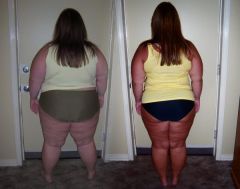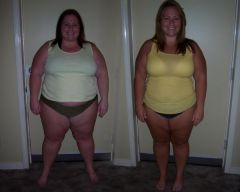Here is a longer one...kinda makes my head hurt.
IS STARVATION MODE A MYTH? NO! STARVATION MODE IS VERY REAL AND HERE’S THE SCIENTIFIC PROOF
QUESTION:
Tom, I was wondering if you had seen the 6 part e-mail series sent out by [name deleted] from [website deleted]. if you look at the last part, he basically states that “starvation mode” is a bunch of crap made up in order to sell diet programs. He didn’t mention you, but it almost sounds like he’s talking about you specifically. How do you feel about this?
ANSWER:
Yes, I saw that article/email and the author is mistaken about starvation mode. In his article, he accused those of us who use the term “starvation mode” as being unscientific and he even says “dont buy diet books if they mention the starvation mode.” I’ll make it clear in a moment, that in this case, he is the one who doesn’t appear very well read in the scientific literature on the effects of starvation and low calorie diets.
I do have to point out first that the effects of starvation mode are indeed sometimes overblown. There are also myths about the starvation mode, like it will completely “shut down” your metabolism (doesn’t happen), or that if you miss one meal your metabolism will crash (doesn’t happen that fast, although your blood sugar and energy levels may dip and hunger may rise).
Another myth about starvation mode is that adaptive reduction in metabolic rate (where metabolism slows down in response to decrease calorie intake) is enough to cause a plateau. That is also not true. it will cause a SLOW DOWN in progress but not a total cessation of fat loss.
As a result of these myths, I have even clarified and refined my own messages about starvation mode in the past few years because I don’t want to see people panic merely because they miss a meal or they’re using an aggressive caloric deficit at times. I find that people tend to worry about this far too much.
However, starvation response is real, it is extremely well documented and is not just a metabolic adaptation - it is also a series of changes in the brain, mediated by the hypothalamus as well as hormonal changes which induce food seeking behaviors.
Here is just a handful of the research and the explanations that I have handy:
Ancel Key’s Minnesota starvation study is the classic work in this area, which dates back to 1950 and is still referenced to this day. In this study, there was a 40% decrease in metabolism due to 6 months of “semi-starvation” at 50% deficit.
Much or most of the decrease was due to loss of body mass, (which was much more pronounced because the subjects were not weight training), but not all of the metabolic decline could be explained simply by the loss of body weight, thus “metabolic adaptation” to starvation was proposed as the explanation for the difference.
Abdul Dulloo of the University of Geneva did a series of studies that revisited the 1300 pages of data that keys collected from this landmark study, which will not ever be repeated due to ethical considerations. (it’s not easy to do longitudinal studies that starve people, as you can imagine)
Here’s one of those follow up studies:
“Adaptive reduction in basal metabolic rate in response to food deprivation in humans: a role for feedback signals from fat stores. Dulloo, Jaquet 1998. American journal of clinical nutrition.
Quote:
“It is well established from longitudinal studies of human starvation and semistarvation that weight loss is accompanied by a decrease in basal metabolicrate (BMR) greater than can be accounted for by the change in body weight or body composition”
“the survival value of such an energy-regulatory process that limits tissue depletion during food scarcity is obvious.”
Also, starvation mode is a series of intense food seeking behaviors and other psychological symptoms and if you do any research on the minnesota study and other more recent studies, you will find out that starvation mode as a spontaneous increase in food seeking behavior is very, very real.
Do you think sex is the most primal urge? Think again! Hunger is the most primal of all human urges and when starved, interest in everything else including reproduction, falls by the wayside until you have been re-fed.
There are even changes in the reproductive system linked to starvation mode: It makes total sense too because if you cannot feed yourself, how can you have offspring and feed them - when you starve and or when body fat drops to extremely low levels, testosterone decreases in men, and menstrual cycle stops in women.
Starvation mode is not just adaptive reduction metabolic rate - it is much more.
There IS a controversy over how much of the decrease in metabolism with weight loss is caused by starvation mode, but the case is extremely strong:
For example, this study DIRECTLY addresses the controversy over HOW MUCH of a decrease in metabolism really occurs with starvation due to adaptive thermogenesis and how much is very simply due to a loss in total body mass.
Doucet, et al 2001. British journal of nutrition. “Evidence for the existence of adaptive thermogenesis during weight loss.”
quote:
“It should be expected that the decrease in resting energy expenditure that occurs during weightloss would be proportional to the decrease in body substance. However, in the case of underfeeding studies, acute energy restriction can also lead to reductions in resting energy expenditure which are not entirely explained by changes in body composition.”
Starvation response is even a scientific term that is used in obesity science textbooks - word for word - CONTRARY to the claim made by the expert mentioned earlier who thinks the phrase, starvation mode is “unscientific.”
Handbook of Obesity Treatment, by wadden and stunkard
(two of the top obesity scientists and researchers in the world )
quote:
“The starvation response - which is an increase in food seeking behavior - is most likely mediated by the decrease in leptin associated with caloric deprivation.”
Textbooks on nutritional biochemistry also acknowledge the decrease in metabolism and distinguish it as an adaptive mechanism, distinct from the decrease in energy expenditure that would be expected with weight loss. In this case, the author also mentions another downside of very low calorie diets: spontaneous reduction in physical activity.
Biochemical And Physiological Aspects of Human Nutrition by SM. Stipanauk, professor of nutritional sciences, Cornell University (WB Saunders company, 2000)
Quote:
“During food restriction, thermic effect of food and energy expenditure decrease, as would be expected from reduced food intake and a reduction in total body mass. Resting metabolic rate, however declines more rapidly than would be expected from the loss of body mass and from the decline in spontaneous physical activity due to general fatigue.
This adaptive reduction in resting metabolic rate may be a defense against further loss of body energy stores.”
Granted, it is more often referred to as “metabolic adaptation” or “adaptive reduction in metabolic rate.” However, starvation mode and starvation response are both terms found in the scientific literature, and they are more easily understood by the layperson, which is why I choose to use them.
Another effect of starvation mode is what happens after the diet: A sustained increase in appetite and a sustained reduction of metabolic rate that persists after the diet is over. Although controversial, this too is documented in the literature:
American Journal clinical nutrition 1997. Dulloo “post starvation hyperphagia and body fat overshooting in humans.”
American Journal Clin Nutrition 1989, Elliot et al. “Sustained depression of the resting metabolic rate after massive weight loss”
quote:
“Resting metabolic rate of our obese subjects remained depressed after massive weight loss despite increased caloric consumption to a level that allowed body weight stabilization.”
and Dulloo 1998:
“The reduction in thermogenesis during semistarvation persists after 12 weeks of restricted refeeding, with its size being inversely proportional to the degree of fat recovery but unrelated to the degree of fat free mass recovery.”
By the way, this explains what some people refer to as “metabolic damage” and although this is not a scientific phrase, you can see that it too is a reality. It is the lag time between when a diet ends and when your metabolism and appetite regulating mechanisms get back to normal.
Last, but certainly not least, and perhaps the best indicator of starvation mode is the hormone LEPTIN. you could spend weeks studying leptin and still not cover all the data that has been amassed on this subject.
Leptin IS the anti starvation hormone. Some people say leptin IS the starvation mode itself because it regulates many of the negative effects that occur during starvation.
leptin is secreted mostly from fat cells and it signals your brain about your fat stores. If your fat stores diminish (danger of starvation), your leptin decreases. If your calorie intake decreases, your leptin level decreases.
When leptin decreases, it essentially sounds the starvation alarm. In response, your brain (hypothalamus) sends out signals for other hormones to be released which decrease metabolic rate and increase appetite.
In summary and conclusion: There is no debate whatsoever about the existence of starvation mode - IT EXISTS and is well documented.
There is also no debate whatsoever that metabolic rate decreases with weight loss. It happens and is well documented, and it is a reason for plateuas.
There’s really only ONE debate about starvation mode that is — HOW MUCH of the starvation mode is comprised of adaptive reduction in metabolic rate and how much is due to loss of total body mass and increased feeding behaviors?
Researchers are still debating these questions, in fact just earlier this year another study was releasd by Major and Doucet in the international journal of obesity called, “clinical significance of adaptive thermogenesis.”
Here’s a quote from this latest (2007) study: “Adaptive thermogenesis is described as the decrease in energy expenditure beyond what could be predicted from the changes in fat mass or fat free mass under conditions of standardized physical activity in response to a decreased energy intake, and could represent in some individuals another factor that impedes weight loss and compromises the maintenance of a reduced body weight.”
I respect the work that other fitness professionals are trying to do to debunk diet and fitness myths, but this fellow didn’t seem to do his homework and totally missed the boat on this article about starvation mode.
What’s really odd is that he didn’t quote a single study in his article, despite his repeated reference to “scientific research.”
If he wanted to argue against adaptive reduction in metabolic rate and chalk starvation mode up purely to increase in food seeking behaviors… and if he wanted to attribute the decreased metabolism with weight loss purely to lost body mass, he easily could have done that. But he didn’t cite ANY studies. He just expects us to take his word for it that “starvation mode is a myth,” and people like me who use the phrase starvation mode are “unscientific”
Either way you argue it - and whatever you choose to call it - “starvation response” is a scientific fact and that’s why prolonged low calorie diets are risky business and mostly just quick fixes.
The rapid weight loss in the beginning is an illusion: Starvation diets catch up with you eventually… just like other habits such as smoking appear to do no harm at first, but sooner or later the damage is done.
For years I’ve considered it so important to understand the consequences of starvation diets that my entire burn the fat program is built around helping you recover from metabolic damage from past diet mistakes, to avoid the starvation mode, or to at least keep the effects of the starvation mode to a minimum so you can lose the fat and keep the muscle.
Sincerely,
Your friend and “Burn The fat coach”
Tom Venuto, CSCS, NSCA-CPT
www.BurnTheFat.com
PS. For more information on getting lean without starving yourself or harming your metabolism, visit my website at www.BurnTheFat.com.














